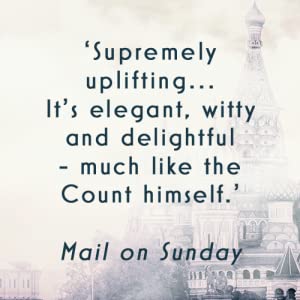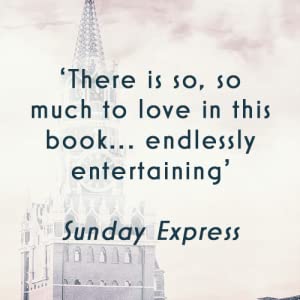Customer Services
Copyright © 2025 Desertcart Holdings Limited
Desert Online General Trading LLC
Dubai, United Arab Emirates



A Gentleman in Moscow: The worldwide bestseller





D**A
Loved this book a classic for every collection
One of the best written books
O**A
complete nonsense
I am a Russian and I am a historian. I had to read this book for a session of the Reading club and I was outraged at the authour's ignorance of the basic facts of Russian and European History. Let's see some examples of it. According to the book, the main protagonist of the book learned that the tsar family was in danger, and inmediately went to Russia from France. But in 1917-1918 Europe was in the fire of the Great war and nobody could pass from France through Germany to Russia. There was no other way to Russia, because travelling in the sea was extremely dangerous. All Russian citizens caught in France by the war could not return to Russia. And by the November of 1918, the end of the war, the tsar and his family were already dead.Another example. In the early 1920s when the protagonist of the book ate different pastries in a trendy pastry shop in Moscow and spoke with a daughter of a Comissar, there was a civil war in Russia and a great famine, because the war interrupted the normal agricultural works. People in Moscow had difficulties in buying the bread, let alone pastries.Every page of this book is full of these kind of mistakes. I cannot take this book or this story seriously. It has nothing to do with the real Russia or Russian history or Russian culture. It only reflects the ignorance of this writer who never tried to learn something about the subject he writes about.
T**N
Sincere, compassionate, witty and elegant: a complete gem
Unlike many people, I hadn't read Rules of Civility when I came to this novel and so I had no idea what to expect. It charmed its way into my heart from the very first page and, by the end, I was utterly enchanted.This is the story of the elegant Count Alexander Rostov who, in 1922 at the age of 33, is brought before a Bolshevik tribunal in Moscow. Condemned on the grounds of being an unrepentant aristocrat, he is saved from the firing squad by virtue of a youthful poem whose sentiments chime with the revolutionary desire for change. Instead of death, he is condemned to lifelong house arrest in his current place of residence: the Metropol Hotel. Removed from his suite and banished to a tiny room in the attics, the Count finds that his material circumstances have been much reduced, but he’s a philosopher at heart and faces his change in fortunes with one resolve: to master his life before his life masters him. And thus we see this wise, gracious gentleman learning to cut his cloth to its new measure. He turns his eyes away from the lilacs in the Alexander Gardens, forgets the glamour of his accustomed seat at the Bolshoi and learns to do without the delicate pastries of Filippov’s. Instead he finds a new subject for his examination: mankind.The story is leavened by moments of absurdity and shot through with quiet heartbreak, like a perfectly pitched symphony. Towles is thoughtful but never sentimental; heartwarming but never sickly; and bittersweet but never bitter. The difficulty is that one can’t explain why something is beautiful. If you asked me to explain why a painting or an aria or a poem was beautiful, I couldn’t do it. All I can say is that it is. And it’s the same here. Like any fine artwork, the story is perfectly balanced, and both reflects and transcends its time. We may not step outside the Metropol but, like the Count, we can watch the vagaries of Fortune as they blow in through the revolving doors, and study the metamorphosis of Bolshevism. Despite its weighty underlying themes, the story itself is designed with such care that it seems to sparkle, suspended, with an air of sprezzatura.I feel privileged to have spent this time in the company of Count Rostov – or, as I feel I almost have the right to call him, Sasha. This novel is joining the select ranks of my comfort books, and I’ll certainly be reading it again. In the meantime, all I can do is recommend it heartily to you as perfect material for a winter’s night curled in a blanket against the bitter cold outside. At a time when sincerity, tolerance and compassion are in short supply in the world around us, I’m delighted to discover that here these virtues become the very touchstones which enable a remarkable protagonist to weather the perils of a changing existence. A wonderful, heartwarming book.To read the full review, please visit my blog.
R**D
Internal exile as never before conceived.
A wonderful book. A one off in terms of its originality, written with panache and elegance of style, and with a most intriguing central character( an aristocrat and old school style gentleman) plus a cast of interesting supportive secondary characters. The count's fortitude in dealing with his forced internal exile for simply being who he is finds him in the unusual position of maintaining his former residence in the premier hotel in Moscow, but in somewhat reduced circumstances. This is beautifully depicted. The narrative will hold you right to the end which you will regret as you will hanker for more.It is erudite but carries its scholarship lightly. The novel's progression with the Bolshevik revolutionary era as an initial backdrop to the later Cold War years adds both drama plus at times a light hearted and funny quixotic touch to the story. Highly recommended.
G**R
A fun fanciful fable, but misplaced
This almost works as a readable and engaging fairy story. It’s a Russian male version of Mary Poppins. The aristocrat Count Alexander Ilyich Rostov is a paragon of charm, virtue and erudition, only slightly more real in that he does have a lover. Even the Red army colonel Osip Ivanovich Glebnikov is full of intellectual curiosity when he’s not liquidating the enemies of the people. Make believe has its role as a genre, as does the celebration of human virtue. But setting such a light-hearted tale in the hotel Metropole minutes away from the Lubyanka during the Terror is a category error. It is inevitably dismissive of the true horror and suffering portrayed by Solzhenitsyn, Mandelstam and others. Great literature engages the real human story. Fairy stories should be set elsewhere.
D**S
Beautifully crafted enjoyable work
Brilliant episodes of the Count's experience in the Hotel Metropole in Russia about the time of the Revolution. Beautiful language, beautiful observation. About time someone out there wrote in a sophisticated, yet approachable way, which entertains, captivates and educates all in a sensitively observed narrative held together by rounded characters and interesting episodes. Best book I have read in ages.
Trustpilot
1 month ago
3 weeks ago